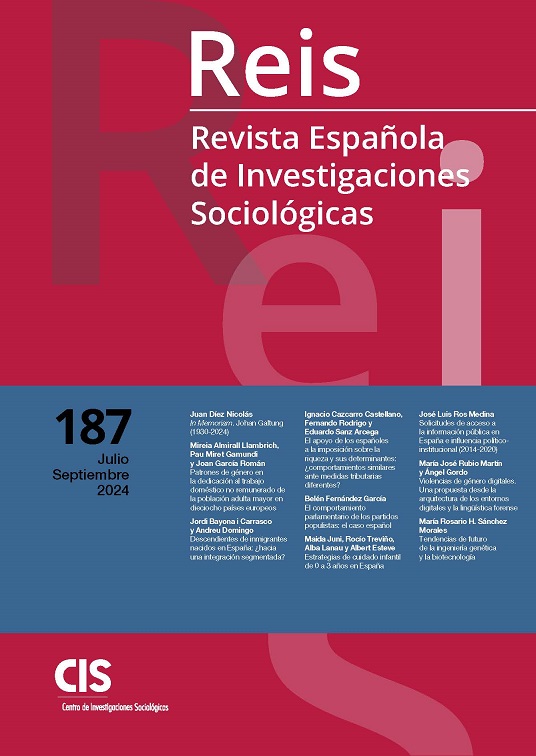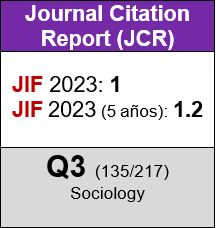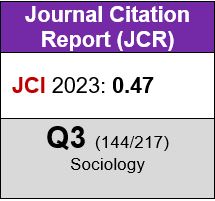El apoyo de los españoles a la imposición sobre la riqueza y sus determinantes: ¿comportamientos similares ante medidas tributarias diferentes?
DOI:
https://doi.org/10.5477/cis/reis.187.45-64Palabras clave:
Barómetro fiscal, España, Impuesto sobre el Patrimonio, Impuesto sobre Sucesiones y Donaciones, Política de imposición sobre la riqueza, Preferencias impositivasResumen
Este artículo explora los determinantes de las preferencias de los españoles que apoyan la tributación sobre la riqueza, esclareciendo también si aquellos se comportan de manera similar cuando se enfrentan a tres alternativas de política fiscal sobre la riqueza. Con base en la revisión de la literatura, explotamos el cuestionario especial incluido en la oleada de 2019 del Barómetro Fiscal del Instituto de Estudios Fiscales y realizamos tres ejercicios empíricos, cada uno dedicado, correlativamente, a una delas tres alternativas de política fiscal consideradas. Siguiendo los resultados obtenidos, corroborados en un análisis de robustez, las preferencias de los españoles se basan en argumentos de autointerés y también en valores, y se comportan, casi en su totalidad, de la misma forma entre las diferentes alternativas de política tributaria examinadas. Del análisis realizado, surgen posibles recomendaciones para el decisor público.
Descargas
Citas
Ackert, Lucy F.; Gillette, Ann B.; Martínez-Vázquez, Jorge y Rider, Mark (2007). «Voting on Tax Policy Design». Public Finance Review, 35(2): 263-284. DOI: https://doi.org/10.1177/1091142106293102
Ackert, Lucy F.; Martínez-Vázquez, Jorge y Rider, Mark (2007). «Social Preferences and Tax Policy Design: Some Experimental Evidence». Economic Inquiry, 45(3): 487-501. DOI: https://doi.org/10.1111/j.1465-7295.2007.00048.x
Andreoli, Francesco y Olivera, Javier (2020). «Preferences for Redistribution and Exposure to Tax-benefit Schemes in Europe». European Journal of Political Economy, 63. doi: 10.1016/j.ejpoleco.2020.101880 DOI: https://doi.org/10.1016/j.ejpoleco.2020.101880
Ballard-Rosa, Cameron; Martin, Lucy y Scheve, Kenneth (2017). «The Structure of American Income Tax Policy Preferences». The Journal of Politics 79(1): 1-16. DOI: https://doi.org/10.1086/687324
Barnes, Lucy (2015). «The Size and Shape of Government: Preferences over Redistributive Tax Policy». Socio-Economic Review, 13(1): 55-78. DOI: https://doi.org/10.1093/ser/mwu007
Barnes, Lucy (2022). «Taxing the Rich: Public Preferences and Public Understanding». Journal of European Public Policy, 29(5): 787-804. DOI: https://doi.org/10.1080/13501763.2021.1992485
Bartels, L. M. (2005). «Homer Gets a Tax Cut: Inequality and Public Policy in the American Mind». Perspectives on Politics, 3(1): 15-31. DOI: https://doi.org/10.1017/S1537592705050036
Bierbrauer, Félix; Boyer, Pierre; Lonsdale, Andrew y Peichl, Andreas (2021). «Tax Reforms and Political Feasibility». halshs-03693413.
Bischoff, Ivo y Kusa, Nataliya (2015). «Policy Preferences for Inheritance Taxation». MAGKS Papers on Economics 201531.
Calzada, Inés y Pino, Eloísa del (2008). «Perceived Efficacy and Citizens´ Attitudes toward Welfare State Reform». International Review of Administrative Sciences, 74(4): 555-574. DOI: https://doi.org/10.1177/0020852308098468
Calzada, Inés; Gómez-Garrido, María; Moreno-Fernández, Luis y Moreno-Fuentes, Francisco J. (2013). «Regímenes de bienestar y valores en Europa». Revista Española de Investigaciones Sociológicas, 141: 61-90.
Calzada, Inés y Pino, Eloísa del (2013). «Algo cambia, algo permanece: los españoles ante el gasto público, el gasto social y los impuestos durante la crisis (2008-2012)». Presupuesto y Gasto Público, 71: 171-192.
Calzada, Inés y Pino, Eloísa del (2019). «Jóvenes y actitudes hacia los impuestos en España». Panorama Social, 30: 171-182.
Cerno, Leonel; Pérez-López, César y Sanz-Arcega, Eduardo (2017). «Determinantes de la satisfacción de los españoles con las prestaciones y servicios públicos: un enfoque de sociología tributaria con microdatos». Hacienda Pública Española/Review of Public Economics, 220: 57-87. DOI: https://doi.org/10.7866/HPE-RPE.17.1.2
Cherry, Todd L.; Kallbekken, Steffen y Kroll, Stephan (2014). «The Impact of Trial Runs on the Acceptability of Pigouvian Taxes: Experimental Evidence». Resource and Energy Economics, 38(C): 84-95. DOI: https://doi.org/10.1016/j.reseneeco.2014.06.005
Chetty, Raj; Looney, Adam y Kroft, Kory (2009). «Salience and Taxation: Theory and Evidence». American Economic Review, 99(4): 1145-117. DOI: https://doi.org/10.1257/aer.99.4.1145
Chirvi, Malte y Schneider, Cornelius (2020). Preferences for Wealth Taxation: Design, Framing and the Role of Partisanship. arqus Discussion Paper, No. 260, Arbeitskreis Quantitative Steuerlehre (arqus).
Cicuéndez-Santamaría, Ruth (2017). «Las preferencias de gasto público de los españoles: ¿interés propio o valores?». Revista Española de Investigaciones Sociológicas, 160: 19-38. DOI: https://doi.org/10.5477/cis/reis.160.19
Cicuéndez-Santamaría, Ruth (2018). Los ciudadanos y la política fiscal: opiniones y actitudes de los españoles hacia los impuestos. Madrid: IX Congreso Internacional en Gobierno, Administración y Políticas Públicas GIGAPP.
CIS (2019). Opinión Pública y Política Fiscal (XXXVI). Estudio n.º 3259. Madrid: Centro de Investigaciones Sociológicas. Disponible en: https://www.cis.es/cis/export/sites/default/-Archivos/Marginales/3240_3259/3259/es3259mar.pdf
Comité de Personas Expertas (2022). Libro Blanco sobre la Reforma Tributaria. Ministerio de Hacienda y Función Pública. Disponible en: https://www.ief.es/docs/investigacion/comiteexpertos/LibroBlancoReformaTributaria_2022.pdf
Diamond, Peter y Saez, Emmanuel (2011). «The Case for a Progressive Tax: From Basic Research to Policy Recommendations». Journal of Economic Perspectives, 25(4): 165-190. DOI: https://doi.org/10.1257/jep.25.4.165
Dornstein, Miriam (1987). «Taxes: Attitudes and Perceptions and their Social Bases». Journal of Economic Pyschology, 8(1): 55-76. DOI: https://doi.org/10.1016/0167-4870(87)90006-7
Edlund, Jonas (2000). «Public Attitudes toward Taxation: Sweden 1981-1997». Scandinavian Political Studies, 23(1): 37-62. DOI: https://doi.org/10.1111/1467-9477.00030
Edlund, Jonas (2003). «Attitudes Towards Taxation: Ignorant and Incoherent?». Scandinavian Political Studies, 26(2): 145-167. DOI: https://doi.org/10.1111/1467-9477.00083
Eisenstein, Louis (1961). The Ideologies of Taxation. New York: The Ronald Press Co.
Emmenegger, Patrick y Lierse, Hanna (2022). «The Politics of Taxing the Rich: Declining Tax Rates in Times of Rising Inequality». Journal of European Public Policy, 29(5): 647-651. DOI: https://doi.org/10.1080/13501763.2021.1993313
Falkinger, Josef (1988). «Tax Evasion and Equity: A Theoretical Analysis». Public Finance, 43(3): 388-395.
Fisman, Raymond; Gladstone, Keith; Kuziemko, Ilyana y Naidu, Suresh (2020). «Do Americans Want to Tax Wealth? Evidence from Online Surveys». Journal of Public Economics, 188(C). doi: 10.1016/j.jpubeco.2020.104207 DOI: https://doi.org/10.1016/j.jpubeco.2020.104207
Gemmel, Norman; Morrissey, Oliver y Pinar, Abuzer (2002). «Fiscal Illusion and Political Accountability: Theory and Evidence from Two Local Tax Regimes in Britain». Public Choice, 110: 199-224. DOI: https://doi.org/10.1023/A:1013015330173
Gemmel, Norman; Morrissey, Oliver y Pinar, Abuzer (2004). «Tax Perceptions and Preferences over Tax Structure in the United Kingdom». The Economic Journal, 114: F117-F138. DOI: https://doi.org/10.1111/j.0013-0133.2004.00190.x
Giachi, Sandro (2020). «Social Dimensions of Tax Evasion: Trust and Tax Morale in Contemporary Spain». Revista Española de Investigaciones Sociológicas, 145: 73-98.
Gutiérrez, Rodolfo; López-Rodríguez, Fermín y Tejero, Aroa (2023). «Intereses y valores: la satisfacción con las pensiones y la sanidad en España antes y después de la Gran Recesión». Revista Española de Investigaciones Sociológicas, 181: 41-60. DOI: https://doi.org/10.5477/cis/reis.181.41
Guvenen, Fatih; Kuruscu, Burhanettin; Kambourov, Gueorgui; Ocampo, Sergio y Chen, Daphne (2019). «Use It or Lose it: Efficiency Gains from Wealth Taxation». Federal Reserve Bank of Minneapolis Working Paper, No. 764. DOI: https://doi.org/10.3386/w26284
Heinemann, Friedrich y Hennighausen, Tanja (2019). «Don´t Tax Me? Determinants of Individual Attitudes Toward Progressive Taxation». German Economic Review, 16(3): 255-289. DOI: https://doi.org/10.1111/geer.12050
Herrero-Alcalde, Ana; Goenaga-Ruiz-de-Zuazu, María y Tránchez-Martín, José M. (2018). «Revisiting Responsibility Attribution within Multilevel Governments: The Role of Information». Hacienda Pública Española/Review of Public Economics, 226: 37-58. DOI: https://doi.org/10.7866/HPE-RPE.18.3.2
Hettich, Walter y Winer, Stanley L. (1988). «Economic and Political Foundations of Tax Structure». American Economic Review, 78(4): 701-712.
Iglesias, Emma M.; Pena-López, Atilano y Sánchez-Santos, José M. (2013). «Evolution over Time of the Determinants of Preferences for Redistribution and the Support for the Welfare State». Applied Economics, 45(30): 4260-4274. DOI: https://doi.org/10.1080/00036846.2013.778948
INE (2022). Indicadores de calidad de vida. Condiciones materiales de vida (económicas). Desigualdad (S80/S20). Serie 2008-2021 por CC.AA. y periodo. Madrid: Instituto Nacional de Estadística. Disponible en:
https://www.ine.es/jaxi/Datos.htm?path=/t00/ICV/dim1/l0/&file=11401_2.px
Jaime-Castillo, Antonio M. y Sáez-Lozano, José L. (2016). «Preferences for Tax Schemes in OECD Countries, Self-interest and Ideology». International Political Science Review, 37(1): 81-98. DOI: https://doi.org/10.1177/0192512114539716
Kim, Jong H. (2019). «Multicollinearity and Misleading Statistical Results». Korean J Anesthesiol, 72(6): 558-569. DOI: https://doi.org/10.4097/kja.19087
Kleven, Henrik J. (2014). «How Can Scandinavians Tax So Much?». Journal of Economic Perspectives, 28(4): 77-98. DOI: https://doi.org/10.1257/jep.28.4.77
Lago-Peñas, Santiago (2022). Déficit y consolidación fiscal en España: ¿Qué opinan los ciudadanos? Nota Técnica FUNCAS, junio 2022.
Lierse, Hanna (2022). «Globalization and the Societal Consensus of Wealth Tax Cuts». Journal of European Public Policy, 29(5): 748-766. DOI: https://doi.org/10.1080/13501763.2021.1992487
Limberg, Julian y Seelkopf, Laura (2022). «The Historical Origins of Wealth Taxation». Journal of European Public Policy, 29(5): 670-688. DOI: https://doi.org/10.1080/13501763.2021.1992486
López-Laborda, Julio y Sanz-Arcega, Eduardo (2016a). «Las preferencias por la redistribución de los españoles a comienzos del siglo XXI». Revista de Estudios Políticos, 171: 137-166. DOI: https://doi.org/10.18042/cepc/rep.171.05
López-Laborda, Julio y Sanz-Arcega, Eduardo (2016b). «La moral fiscal de los españoles, reexaminada». Revista de Economía Aplicada, XXIV(70): 53-76.
López-Laborda, Julio y Rodrigo, Fernando (2022). «Mobility of Top Income Taxpayers in Response to Regional Differences in Personal Taxes: Evidence from Spain». Economics, 16: 152-169. DOI: https://doi.org/10.1515/econ-2022-0016
Loureiro, María L.; Labandeira, Xavier y Hanemann, Michael (2013). «Transport and Low-carbon Fuel: A Study of Public Preferences in Spain». Energy Economics, 40: S126-S133. DOI: https://doi.org/10.1016/j.eneco.2013.09.010
Luttmer, Erzo F. P. y Singhal, Monica (2014). «Tax Morale». Journal of Economic Perspectives, 28(4): 149-168. DOI: https://doi.org/10.1257/jep.28.4.149
Mettler, Suzanne (2011). The Submerged State: How Invisible Government Policies Undermine American Democracy. Chicago: Chicago University Press. DOI: https://doi.org/10.7208/chicago/9780226521664.001.0001
Ministerio de Hacienda (2019). Libro Electrónico «Tributación Autonómica. Medidas
». Madrid: Ministerio de Hacienda.
Navas, María (coord.) (2020). «Opiniones y actitudes fiscales de los españoles en 2019». Documento de Trabajo del Instituto de Estudios Fiscales 9/2020.
Neimanns, Erik (2023). «Welfare States, Media Ownership and Attitudes towards Redistribution». Journal of European Public Policy, 30(2): 234-253. DOI: https://doi.org/10.1080/13501763.2021.1986117
Novo-Corti, Isabel; Díaz-Roldán, Carmen y Ruesga-Benito, Santos M. (2020). «Presión y fraude fiscales, predisposición a pagar impuestos y satisfacción personal en España». Revista Española de Investigaciones Sociológicas, 172: 101-120. DOI: https://doi.org/10.5477/cis/reis.172.101
O´Brien, Rourke L. (2017). «Redistribution and the New Fiscal Sociology: Race and the Progressivity of State and Local Taxes». American Journal of Sociology, 122(4): 1015-104. DOI: https://doi.org/10.1086/690118
OCDE (2018). The Role and Design of Net Wealth Taxes in the OECD. Paris: OECD Tax Policy Studies, OECD Publishing. doi: 10.1787/9789264290303-en DOI: https://doi.org/10.1787/9789264290303-en
OCDE (2021a). OECD Fiscal Decentralisation Database. Paris: OECD. Disponible en: https://www.oecd.org/tax/federalism/fiscal-decentralisation-database/
OCDE (2021b). Inheritance Taxation in OECD Countries. Paris: OECD Tax Policy Studies, OECD Publishing. doi: 10.1787/e2879a7d-en DOI: https://doi.org/10.1787/e2879a7d-en
Olivera, Javier y Kerm, Philippe van (2022). «Public Support for Tax Policies in COVID-19 Times: Evidence from Luxembourg». Int Tax Public Finance, 29(6): 1395-1418. DOI: https://doi.org/10.1007/s10797-022-09744-y
Pino, Eloísa del (2004). Los ciudadanos y el Estado: las actitudes de los españoles hacia las admistraciones y las políticas públicas. Madrid: Instituto Nacional de Administración Pública.
Psacharopoulos, George y Patrinos, Harry A. (2018). «Returns to Investment in Education: A Decennial Review of the Global Literature». Education Economics, 26 (5): 445-458. DOI: https://doi.org/10.1080/09645292.2018.1484426
Rowlingson, Karen; Sood, Amrita y Tu, Trinh (2021). «Public Attitudes to a Wealth Tax: The Importance of `Capacity to Pay´». Fiscal Studies, 42: 431-455. DOI: https://doi.org/10.1111/1475-5890.12282
Sanz, Carlos (2022). «¿Más o menos impuestos? Renta, confianza en las instituciones y preferencias impositivas». Papeles de Economía Española, 172: 58-68.
Scheuer, Florian y Slemrod, Joel (2021). «Taxing Our Wealth». Journal of Economic Perspectives, 35(1): 207-230. DOI: https://doi.org/10.1257/jep.35.1.207
Seidl, Christian y Traub, Stefan (2001). «Taxpayers´ Attitudes, Behavior, and Perception of Fairness». Pacific Economic Review, 6(2): 255-267. DOI: https://doi.org/10.1111/1468-0106.00131
Soskice, David y Hall, Peter (2001). Varieties of Capitalism: The Institutional Foundations of Comparative Advantage. Oxford: Oxford University Press.
Spiegel, Sebastian E. y Kloss, Alexandra (2017). «Determinants of Tax Fairness Perception and the Role of Self-Interest–Results from Two German Surveys». Eurasian Journal of Economics and Finance, 5(4): 50-75. DOI: https://doi.org/10.15604/ejef.2017.05.04.004
Stantcheva, Stefanie (2020). Undestanding Tax Policy: How Do People Reason? NBER Working Paper No. 27699. DOI: https://doi.org/10.3386/w27699
Ter-Minassian, Teresa (2020). Intergovernmental Fiscal Cooperation and Subnational DOI: https://doi.org/10.18235/0002212
Revenue Autonomy. Inter-American Development Bank Discussion Paper No. IDP-DP-748.
Torregrosa-Hetland, Sara (2015). Tax System and Redistribution: the Spanish Fiscal Transition (1960-1990). PhD Dissertation. Barcelona: Universitat de Barcelona.
Traber, Denise; Hänni, Miriam; Giger, Nathalie y Breunig, Christian (2021). «Social Status, Political Priorities and Unequal Representation». European Journal of Political Research, 61: 351-373. DOI: https://doi.org/10.1111/1475-6765.12456
Descargas
Publicado
Cómo citar
Número
Sección
Licencia
Derechos de autor 2024 Revista Española de Investigaciones Sociológicas

Esta obra está bajo una licencia internacional Creative Commons Atribución-CompartirIgual 4.0.
Permite Compartir — copiar y redistribuir el material en cualquier medio o formato, Adaptar — remezclar, transformar y construir a partir del material para cualquier propósito, incluso comercialmente.








